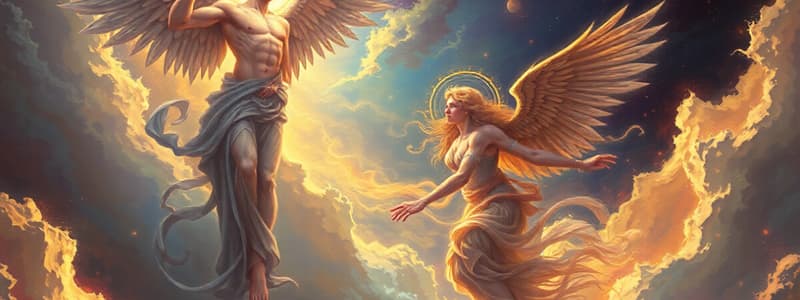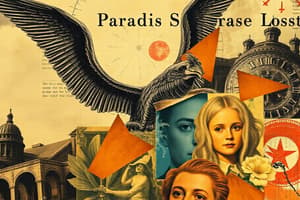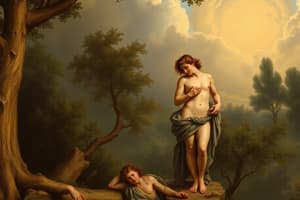Podcast
Questions and Answers
In lines 780-790, which literary device does Milton employ to foreshadow the tragic events that are about to unfold?
In lines 780-790, which literary device does Milton employ to foreshadow the tragic events that are about to unfold?
- Direct address to the reader, explicitly stating the tragic outcome.
- Introduction of a character with a known tragic flaw.
- Use of extended metaphor to compare Eve to a goddess.
- Personification of the natural world reflecting impending doom. (correct)
How does Milton utilize the narrator's tone in lines 780-790 to establish a sense of impending tragedy?
How does Milton utilize the narrator's tone in lines 780-790 to establish a sense of impending tragedy?
- By remaining neutral and detached from the unfolding events.
- By employing a tone of lamentation and foreshadowing with terms like 'rash' and 'evil'. (correct)
- By using triumphant language to describe Eve's actions.
- By creating a sense of excitement and anticipation.
What is the effect of the anaphora in 'she plucked, she ate' concerning Eve's accountability in lines 780-790?
What is the effect of the anaphora in 'she plucked, she ate' concerning Eve's accountability in lines 780-790?
- It serves to emphasize the pleasure and satisfaction Eve derives from eating the fruit.
- It shifts the blame from Eve to external forces, suggesting she was coerced.
- It diminishes Eve's responsibility by reducing her actions to simple verbs.
- It underscores Eve's accountability and highlights her role as a tragic figure responsible for her downfall. (correct)
What does Eve's reference to God as the 'great Forbidder' suggest about her evolving perception of divine authority after eating the fruit?
What does Eve's reference to God as the 'great Forbidder' suggest about her evolving perception of divine authority after eating the fruit?
In lines 838-887, how does Milton portray the immediate effects of the forbidden fruit on Eve?
In lines 838-887, how does Milton portray the immediate effects of the forbidden fruit on Eve?
What does the term 'reached' in the context of Eve's actions suggest, drawing a parallel from earlier in Book IX?
What does the term 'reached' in the context of Eve's actions suggest, drawing a parallel from earlier in Book IX?
Why does Eve decide to share the fruit with Adam, despite the potential consequences?
Why does Eve decide to share the fruit with Adam, despite the potential consequences?
After eating the fruit, Eve refers to herself as being 'mature in knowledge.' What does this statement imply about her understanding of her actions?
After eating the fruit, Eve refers to herself as being 'mature in knowledge.' What does this statement imply about her understanding of her actions?
According to the content, what does Satan do after Eve eats the fruit, as indicated in lines 784-785?
According to the content, what does Satan do after Eve eats the fruit, as indicated in lines 784-785?
In the context of Eve's flawed reasoning after eating the fruit, what does her reference to God in 'confused and paradoxical terms' suggest?
In the context of Eve's flawed reasoning after eating the fruit, what does her reference to God in 'confused and paradoxical terms' suggest?
In lines 838-840, Adam weaves a garland for Eve, which is later described as having 'faded' petals. What does this detail symbolize within the context of their situation?
In lines 838-840, Adam weaves a garland for Eve, which is later described as having 'faded' petals. What does this detail symbolize within the context of their situation?
In what way does the narrator's description of Adam in lines 838-855 use language to emphasize his shock and disbelief upon Eve's return?
In what way does the narrator's description of Adam in lines 838-855 use language to emphasize his shock and disbelief upon Eve's return?
What is the significance of the 'ambrosial' smell of the fruit, as referenced in line 852, and how does it contribute to the irony of the situation?
What is the significance of the 'ambrosial' smell of the fruit, as referenced in line 852, and how does it contribute to the irony of the situation?
In line 854, the language of theatre—'prologue,' 'apology,' and 'prompt'—describes Eve's manner. What is the intended effect of this theatrical language?
In line 854, the language of theatre—'prologue,' 'apology,' and 'prompt'—describes Eve's manner. What is the intended effect of this theatrical language?
What does the word 'bland' (855) suggest about Eve's approach in persuading Adam to eat the fruit?
What does the word 'bland' (855) suggest about Eve's approach in persuading Adam to eat the fruit?
Read Eve's postlapsarian address to Adam (lines 856-885). How does Milton show Eve's self-focus in this address?
Read Eve's postlapsarian address to Adam (lines 856-885). How does Milton show Eve's self-focus in this address?
How does Eve demonstrate dishonesty in her postlapsarian address to Adam (lines 856-885)?
How does Eve demonstrate dishonesty in her postlapsarian address to Adam (lines 856-885)?
How does Eve's postlapsarian rhetoric (lines 856-885) echo arguments previously used by Satan?
How does Eve's postlapsarian rhetoric (lines 856-885) echo arguments previously used by Satan?
In Book IX, lines 856-885, Eve uses the phrase, “Thee I have missed [...] agony of love till now / Not felt.” What does this statement reveal about her portrayal of her feelings towards Adam?
In Book IX, lines 856-885, Eve uses the phrase, “Thee I have missed [...] agony of love till now / Not felt.” What does this statement reveal about her portrayal of her feelings towards Adam?
Considering the broader interpretation of Eve’s character, what does the combination of her 'blithe' countenance and 'bland' words suggest about her intentions toward Adam?
Considering the broader interpretation of Eve’s character, what does the combination of her 'blithe' countenance and 'bland' words suggest about her intentions toward Adam?
Flashcards
Eve's Actions After Eating the Fruit
Eve's Actions After Eating the Fruit
Eve eats the fruit. She praises the tree and views God as a 'great Forbidder'. She decides to tell Adam and share the fruit due to jealousy.
Symbolism of Adam's Garland
Symbolism of Adam's Garland
Adam weaves a garland for Eve, symbolizing domestic excellence, but the faded petals foreshadow mortality.
Milton's Tone of Tragedy
Milton's Tone of Tragedy
The narrator uses lamentation, emphasizing 'rash' action and 'evil' timing, foreshadowing tragic inevitability.
Eve's Accountability
Eve's Accountability
Signup and view all the flashcards
Echoes of the Past
Echoes of the Past
Signup and view all the flashcards
Ambrosial Irony
Ambrosial Irony
Signup and view all the flashcards
Theatrical Deception
Theatrical Deception
Signup and view all the flashcards
Nature's Lament
Nature's Lament
Signup and view all the flashcards
Eve's Confused Logic
Eve's Confused Logic
Signup and view all the flashcards
Eve's Jealousy
Eve's Jealousy
Signup and view all the flashcards
Adam's Shock
Adam's Shock
Signup and view all the flashcards
Eve's Dishonesty
Eve's Dishonesty
Signup and view all the flashcards
Eve winning favour
Eve winning favour
Signup and view all the flashcards
To share the account
To share the account
Signup and view all the flashcards
Study Notes
- Lines 780-838 show Eve eating the fruit and praising the tree, viewing it as a god.
- Eve refers to God as the 'great Forbidder' and sees herself as 'mature in knowledge'.
- She decides to tell Adam about her actions to prevent him from being with 'another Eve' if she is expelled
- This shows her first experience of jealousy.
- Lines 838-887 describe Eve returning to Adam with the forbidden fruit.
- Adam is making a garland of flowers for her, worried about her absence but expectant of her return.
- Eve claims she felt 'agony of love' while away and says the fruit brings bliss, only fully realized if Adam eats it too.
- During this her face is flushed with 'distemper', a condition never seen before.
Tragedy in Opening Lines (780-790)
- There is a lamenting tone that suggests a tragic inevitability.
- "Rash" and "evil" suggest the negative implications.
- Anaphora ('she plucked, she ate') highlights Eve's accountability for her downfall.
- Caesurae in 'she plucked, she ate:' emphasizes the tragic moment through simplicity.
- The term 'reached' recalls Satan's deceptive depiction of the fruit and the term 'hand' reminds of Adam and Eve's separation in Book IX
- The use of 'seemed' shows Eve is misguided, and 'fancies' indicates temporary delusion, amplifying tragedy.
- Natural world is personified ('sighing', 'signs of woe') reflecting universal consequences of individual action.
Satan's Actions
- After Eve eats the fruit, Satan hides to see if Adam will also fall, and will hear their judgement later in Book X.
Eve's State and Flawed Logic
- Eve is described as ‘heightened as with wine, jocund and boon'
- This shows a contemporary belief of drunkenness and loss of Reason were the immediate effects of the Fall.
- Eve's actions suggest excessive appetite and passion
- Eve uses confused and paradoxical terms when talking about God
- There are signs of idolatry in her address to the tree
- Eve conflates ‘wisdom' and knowledge, preferring 'experience' to strict obedience
- She shows signs of pride, mistakenly believes she is becoming 'free', and shows jealousy.
Examples of Eve's Flawed Logic
- Actions show excessive appetite ('Greedily she engorged without restraint')
- Confused view of God ('Heaven is high...Our great Forbidder')
- Idolatry in addressing the tree ('henceforth my early care...Shall tend thee')
- Conflates wisdom/knowledge ('Experience, next, to thee I owe...')
- Shows pride ('so to add what wants...inferior, who is free?')
- Mistaken belief in freedom ('for, inferior, who is free?')
- Shows jealousy ('But what if God have seen...A death to think!')
Symbolic Significance of the Garland
- Adam weaves the garland for Eve, meant to celebrate her domestic excellence ('rural labors').
- Reinforces connection between Eve and roses, but faded petals symbolize mortality.
- There is dramatic irony as Eve's rural labors were sinful, harvest bringing death.
- Reminds of association between Eve and agricultural goddesses, foreshadowing her downfall.
- The poetic description with word order and alliteration amplifies pathos.
Adam's Response
- Adam is 'amazed' and ‘astonished', which includes a play on words.
- His body language shows inaction, 'joints relaxed', hand 'slack', and stands ‘speechless'.
- His 'pale' and 'chill[y]' appearance shows shock and surprise
- 'Faltering measure' of his heart highlights disruption to the iambic meter with uneven caesurae.
Ambrosial Smell of the Fruit
- The 'ambrosial' smell means ‘immortality' in Ancient Greek, contrasting with the fruit bringing mortality.
Eve's Theatrical Manner
- Eve's use of 'prologue', 'apology', and 'prompt' suggests her speech is rehearsed, exaggerated, and insincere.
- It reminds the reader of Satan's play-acting from Book IX
- 'Bland' suggests blandishment, a flattering action to persuade.
Eve's Postlapsarian Address to Adam
- She focuses on herself in opening question, ignoring Adam's objection to her departure
- The iambic meter is disrupted by ‘Thee I...', stressing 'I'
- Eve is dishonest, claiming 'agony of love' despite showing no signs of missing Adam
- She claims she sought the fruit's benefits 'for thee', which is not supported by the text.
- Eve uses arguments similar to those made by Satan
- She is eager to share her (misleading) account: ‘strange / Hath been the cause, and wonderful to hear'
- She claims improved attributes ('opener mine eyes...growing up to godhead')
- She invokes fate ('equal lot / May join us')
- She betrays fixation on hierarchy: ‘different degree /Disjoin us'
Villain or Victim?
- Her's first speech uses 'bland' words, but her 'countenance' is 'blithe', raising questions of manipulation
- It questions whether she consciously manipulates Adam or genuinely believes her story
- This raises the broader question of how Eve can be seen as a villain and/or a victim
- C.S. Lewis sees he is a villain, stating that if she is to die, Adam must die with her
- She is committing the sin of murder
- D. McColley argues Milton saw himself in Eve's cultivation of the garden (writing poetry), and her ‘plea for freedom and a little solitude'.
Studying That Suits You
Use AI to generate personalized quizzes and flashcards to suit your learning preferences.




